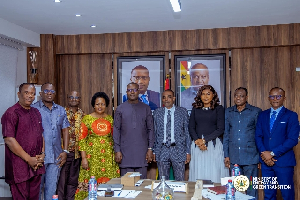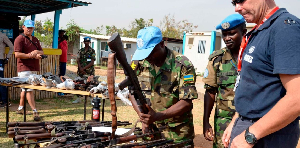projects
Cape Coast, Jan, 24, GNA- The Central Region is to be allocated an additional budgetary allocation of GHC cedis 339,200 under the Income Generating Projects components of the 6th Microprojects Programme to support women and youth groups who are into agro-processing and other economic activities, beginning from this year. To this end, each district assembly would receive an allocation of GHC 21,000 to support the groups who are into corn milling, cassava processing, shea-butter, palm and pea-nut oil extraction, cashew processing, small scale irrigation projects and construction of congenial working places for small scale businesses. These were contained in a speech read for Mr. Kwabena Dankyi Darfoor, programme manager of the European Union/ Government of Ghana Microprojects Management Unit during its educational campaign to launch the second phase of the Microprojects Programme at Cape Coast on Thursday. He said the Income Generating Projects component now being introduced under the Microprojects Programme which originally supported social infrastructural projects in the rural areas, would support women and youth groups would have its modalities for release of funds, budget allocation for projects and criteria for selection of beneficiaries be discussed by all stakeholders. The Microprojects Programme is a collaboration between the Government of Ghana and the European Union to increase access and utilization of good quality basic social and economic infrastructure and services by deprived communities to enhance their quality of life.
Since 1990, 79 districts in the Upper East and West, Northern, Volta, Eastern and Central regions have benefited from the four year programme which is implemented in two phases at each stage of implementation. In the Central Region, a total of 335 projects to improve upon the socio-economic infrastructure of the region had been implemented at a total cost of 24.14 billion cedis since 2001-2005 and these include CHIPs compounds, classroom blocks, culverts, boreholes, teachers and nurses' staff quarters and toilet facilities.
Mr. Darfoor said his outfit had engaged the services of the National Board for Small-Scale Industries (NBSSI) to help the district assemblies identify viable projects, prepare business plans and provide business support services to the selected projects and appealed to the two bodies to work in concert to ensure the successful implementation of the projects. He expressed gratitude to District assemblies and communities which have given maximum support to his office and had adhered to laid down principles and procedures during the first phase and warned district assemblies who out of complacency flout some rules and procedures that, the Unit would withdraw its support and also take disciplinary action against them.
Nana Ato Arthur, Central Regional Minister, commended the European Union for the numerous development interventions, particularly in the area of health, education, water and sanitation, which had helped in mitigating rural communities. He asked assemblies which borrow monies meant for the programme to desist from such acts and support the programme to improve upon the lot of its people. The programme was attended by District Chief Executives, Coordinating Directors, District Planning, Finance and Project Coordinators and other stakeholders.
Regional News of Thursday, 24 January 2008
Source: GNA












